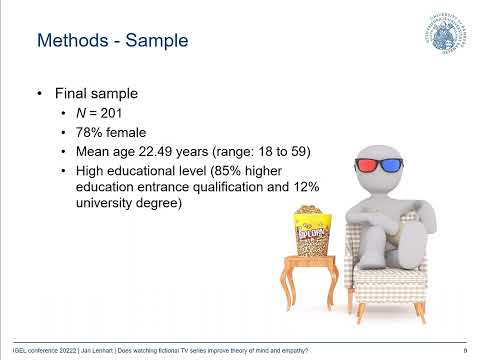 Speaker: Jan Lenhart
Speaker: Jan Lenhart
 Affiliation: Otto-Friedrich-Universität Bamberg
Affiliation: Otto-Friedrich-Universität Bamberg
Title: Does viewing fictional TV series improve theory of mind and empathy?
Abstract (long version below): In a naturalistic online experiment, effects of viewing fictional TV series on theory of mind and empathy as well as moderator effects of narrative processes (i.e., transportation and identification) were examined. To do so, 221 participants viewed either three episodes of a fictional TV series or a documentary at their own convenience during the span of a week. Theory-of-mind performance increased and self-reported empathy decreased from pre- to posttest across both conditions. There were no differences between the conditions and neither transportation nor identification were significant moderators. These findings question beneficial effects of a brief exposure to fictional TV series.

 Long abstract
Long abstract
In a naturalistic online experiment, 221 participants viewed either three episodes of a fictional TV series or a documentary at their own convenience during the span of a week. At the pre- and posttest the participants completed an empathy questionnaire (the Saarbrücker Persönlichkeitsfragebogen which represents a German version of the Interpersonal Reactivity Index; Davis, 1980, Paulus, 2019) and a theory-of-mind task (a German version of the Reading the Mind in the Eyes test; Baron-Cohen et al., 2001). In addition, the participants completed the Transportation Scale – Short Form (Appel et al., 2015) and the Identification with Characters Scale (Igartua, 2010) as well as several control questions at the posttest to ascertain that they had followed the assignments as instructed.
Across both experimental conditions, participants’ theory-of-mind performance increased slightly from pre- to posttest whereas their self-reported empathy decreased slightly. Contrary to the hypotheses, viewing the fictional TV series opposed to the documentary did not differentially influence participants’ social-cognitive skills. Neither transportation nor identification did act as moderator variables. Consequently, the results of the present study cast doubt on beneficial effects of a short-term exposure to fictional TV series on viewers’ social-cognitive skills. Indeed, any effects of brief narrative exposures that are found directly after engaging with a narrative might represent priming effects but not stable improvements of social-cognitive skills (Mumper & Gerrig, 2019; Panero et al., 2016).

